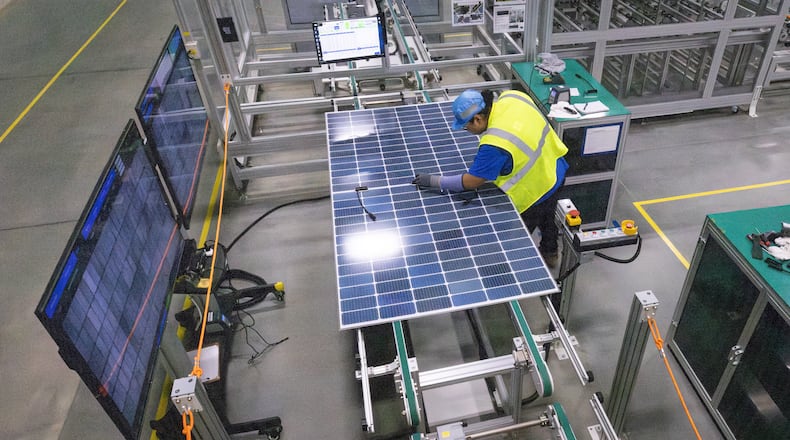The hulking Qcells solar panel manufacturing plant nearing completion 50 miles northwest of Atlanta is set to get new financial backing from a $1.45 billion federal loan, the U.S. Department of Energy (DOE) announced Thursday.
The loan guarantee will help finance the construction of the facility, which has been hyped as a game-changer by the company and President Joe Biden’s administration because it will boast the country’s first fully-integrated solar supply chain under one roof.
On one side of the factory, refined polysilicon will be molded into huge cylinders called ingots. After the material is cut into razor-thin slices, chemical treatments will turn the wafers into photovoltaic cells capable of converting the sun’s rays into electricity. Finally, cells will be assembled into finished solar panels at the opposite end of the plant.
The production of finished modules began at the factory this spring. The manufacturing of wafers, ingots and cells is expected to start by the end of this year, Qcells says.
Credit: Steve Schaefer /
Credit: Steve Schaefer /
Jigar Shah, the director of the DOE’s Loan Programs Office, said the Qcells loan will be the office’s first for polysilicon production. The DOE’s announcement is a conditional commitment for a future loan, meaning Qcells still has some requirements to meet before it can close and begin drawing on the funds, but Shah said the remaining steps are “straightforward.”
Shah said the deals Qcells has in place already to sell its panels gave the department the assurance it needed to offer the loan. Earlier this year, Qcells inked an agreement with Microsoft to supply the tech giant with 12 gigawatts of solar through 2032.
“The fact that they not only have a lot of interest, but people are willing to sign contracts to ensure they will get modules from this facility for the next few years? That has given us confidence that people really want these modules,” Shah said.
At its full capacity, the Cartersville factory will be able to build 3.3 gigawatts of solar panels each year. Qcells also operates a 5.1-gigawatt plant in Dalton, which expanded its capacity last year. The two combined will crank out enough panels to power 1.3 million homes annually and employ 4,000 full-time workers, the company says.
Both the Cartersville factory and the Dalton expansion were part of a $2.5 billion investment Qcells announced to grow its manufacturing presence in Georgia, which was spurred, in part, by incentives in Biden’s signature climate and healthcare law, known as the Inflation Reduction Act (IRA).
By building their products in the U.S., Qcells — which is owned by the Korean corporation Hanwha Solutions — will be able to access a domestic solar manufacturing tax credit created by the IRA. That incentive was crafted by U.S Sen. Jon Ossoff (D-Ga). Companies installing solar are also eligible for tax credits, if enough of the panels they use are made in the U.S.
In a statement, Ossoff praised the loan announcement as “yet another historic federal investment in Georgia solar manufacturing to continue growing our economy and strengthening American energy independence.”
Credit: Steve Schaefer /
Credit: Steve Schaefer /
The loan announcement comes as trade battles continue to roil the global solar industry. The U.S. is trying to stand up its own domestic solar manufacturing supply chain to compete in an industry long dominated by China. Chinese companies control more than 80% of the global production for all components needed to make panels, and the dumping of cheap modules produced in China into markets has long been the bane of other manufacturers.
“We have an oversupply of artificially cheap panels sitting in warehouses that got imported into the U.S.,” said Marta Stoepker, Qcells senior director of corporate communications. “It’s hard to compete against that while you’re trying to build a factory.”
Stoepker said the loan will help ensure the factory gets built and support overall financing of the project.
The Biden administration recently increased tariffs on panels made in China and slapped new duties on those produced in four south Asian countries: Cambodia, Malaysia, Thailand and Vietnam. The U.S. Commerce Department has also launched a probe into allegations Chinese-made panels were diverted through those same countries to circumvent the tariffs. The American Alliance for Solar Manufacturing Trade Committee, which counts Qcells and other U.S. manufacturers among its members, petitioned for the investigation.
But not all corners of the solar industry have backed the escalation of the trade fight, arguing it will take years for a domestic solar industry to develop. In the meantime, they worry more import taxes will harm installers and other producers.
About the Author
Keep Reading
The Latest
Featured





